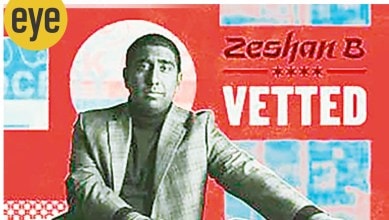Zeshan B’s anthem of resistance and its role in Zohran Mamdani’s historic NYC Mayoral win
US-based Indian-origin musician Zeshan B on campaigning for Zohran Mamdani, his now-viral moment of defiance and using music to start conversations about identity

Wo din dur nahi jab Zohran Mamdani iss haveli mein kadam rakhega/Tab tak mere humsaaye, araam hai haraam (That day is not far when Zohran Mamdani will step into this mansion/ Till then my fellow travellers, we cannot rest),” sang Chicago-based R&B and soul singer Zeshan B while wielding a harmonium days before Indian-origin Zohran Mamdani was elected the new mayor of New York City.
Zeshan was at Gracie Mansion, the stately Upper East Side residence of outgoing New York mayor Eric Adams. He was singing at an event organised by the New York Mayor’s Office for People with Disabilities (MOPD). He himself grew up with echolalia (repetition of words or phrases spoken by another person) and Tourette’s (a neurological condition with sudden and involuntary movements or vocalisations or tics). What Zeshan didn’t expect was that his song, where he chose the concept of Aaram hai haram — a refrain born of anti-colonial struggle — would go viral. When it reached Mamdani, he reposted it, sending it into an overdrive. By the time anyone knew what he meant, as hardly anyone in the audience understood Hindustani, it was too late. Zeshan got away with his song of dissent.
But it was his frustration with the logistics — the guitarist, the sound set-up was “denied” due to security. “There was so much disarray. I felt that this was the time for us to do uncomfortable things. That’s how change comes about. This was my way of stepping up,” says Zeshan. It proved to be prophetic. Mamdani won the mayorship.
As for the song, he had grown up with his Nehruvian and secularist grandparents telling him ‘araam hai haraam’ whenever he was “being lazy”. The slogan was coined by Jawaharlal Nehru, a rallying cry for India’s independence movement. “Zohran also quoted Nehru in his winning speech. I perhaps manifested what was to come,” he says.
Zeshan’s parents moved to the US as part of chain migration. As for his link to protest, it is woven into his family history. His grandparents lived in Hyderabad when the Partition happened and they witnessed firsthand the chaos of the subcontinent broken along religious lines. His grandfather’s shop was burnt down as retaliation to a Hindu man injured or killed, Zeshan is not sure. But the family refused to move to Pakistan. “They were very proud of the fact that they didn’t leave. They never told anyone about the fire incident, including their children. My grandmother told me that they didn’t want their ‘children growing up with prejudiced ideas for the Hindus because our people also did bad things’,” says Zeshan, who created a audio-video project called Borderless Anthems, where he sang Pakistani and Indian national anthems one after the other. “My music is about justice, equality, decency and humanity. And Mamdani is a living embodiment of that,” says Zeshan.
Growing up, he listened to an interesting mishmash of various genres. His parents loved American music, so there was Motown, progressive and classical rock, jazz, Pete Seeger and Bob Dylan playing at home. “But they were also immigrants who longed for Bharat Mata, which manifested in their musical choices. So there was a lot of Bhimsen Joshi and Kumar Gandharva playing,” says Zeshan, who also heard a lot of Mehdi Hasan, KL Saigal, Lata Mangeshkar, Rafi and Kishore Kumar. Zeshan also went to a number of classical baithaks and mushairas.
Trained formally in Western classical music and opera, he felt the tug of soul, blues and R&B. The emotional space wasn’t far away from the Subcontinent’s music. His debut album Vetted (2017) had English and Urdu tracks, pairing civil rights anthems with ghazal-infused originals. His single Brown Power (2020), set against xenophobia and racism, was all about finding pride in being brown. “It was more reactionary. There was a lot of anger. After Trump got elected, there was a rumbling if people would rise?” says Zeshan. The track was employed by representatives of President Biden’s 2020 campaign to mobilise support within Muslim communities.
He has also performed for two US Presidents — Jimmy Carter and Barack Obama. His recent album, O Say, Can You See, a 13-song album, is an orchestral soul record written during the pandemic, where he sings about aspirations and the frailty of human beings and the social issues and structural inequalities that plague America. “Most of the music we love, whether it is Sinatra or Mohammad Rafi, Naushad or Madan Mohan, is all orchestral. That is why it has this rich tapestry of sound. I wanted to go back and create this style. I wanted to be authentic,” says Zeshan.